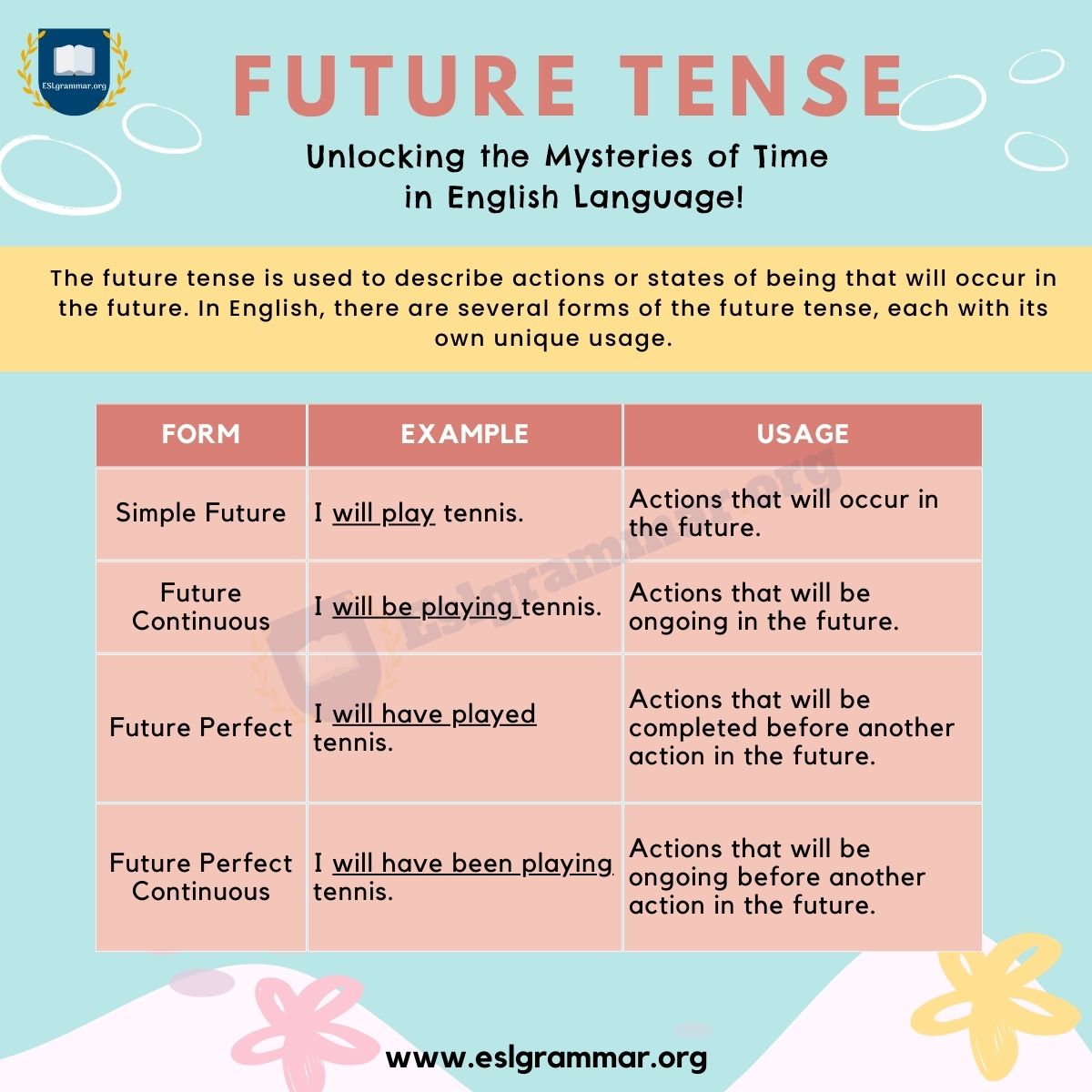Verb Tenses! List of 12 tenses in English with useful grammar rules and examples, including past tense, present tense and future tense. Learn these English tenses with verb tenses chart to master grammar rules in English.
Contents
Verb Tenses
In the English language, tenses play an important role in sentence formation. The tense of a verb shows the time of an event or action.
The concept of time can be split into:
- The Present: What you are currently doing.
- I eat. – I am eating.
- She goes to school. – She is going to school.
- The Past: What you did some time back.
- I ate. – I was eating.
- She went to school. – She was going to school.
- The Future: What you will do later.
- I will eat. – I will be eating
- She will go to school.
Types of Tenses
There are four types of verb tenses. Simple, Perfect, Continuous and Present Perfect Continuous and each of these has a present, past and future form.
Present Tense
Simple Present Tense
In Simple Present, the action is simply mentioned and there is nothing being said about its completeness.
For example:
- I eat.
- I sleep.
- I play.
Present Continuous Tense
In Present Continuous, the action is on-going/ still going on and hence continuous.
For example:
- I am eating.
- I am sleeping.
- I am playing.
Present Perfect Tense
In Present Perfect, the action is complete or has ended and hence termed Perfect.
For example:
- I have eaten.
- I have slept.
- I have played.
Present Perfect Continuous Tense
In Present Perfect Continuous, the action has been taking place for some time and is still ongoing.
For example:
- I have been eating.
- I have been sleeping.
- I have been playing.
Past Tense
Simple Past Tense
In Simple Past, the action is simply mentioned and understood to have taken place in the past.
For example:
- I ate.
- I slept.
- I played.
Past Continuous tense
In Past Continuous, the action was ongoing till a certain time in the past.
For example:
- I was eating.
- I was sleeping.
- I was playing.
Past Perfect Tense
Past Perfect is used to express something that happened before another action in the past.
For example:
- I had eaten.
- I had slept.
- I had played.
Past Perfect Continous Tense
Past Perfect Continuous is used to express something that started in the past and continued until another time in the past.
For example:
- I had been eating.
- I had been sleeping.
- I had been playing.
Future Tense
Simple Future Tense
Simple Future is used when we plan or make a decision to do something. Nothing is said about the time in the future.
For example:
- I will eat.
- I will sleep.
- I will play.
Future Continous Tense
The future continuous tense is used to express action at a particular moment in the future. However, the action will not have finished at the moment.
For example:
- I will be eating at 9 a.m.
- I will be sleeping when you arrive.
- I will be playing at 5 p.m.
Future Perfect Tense
Future Perfect expresses an action that will occur in the future before another action in the future.
For example:
- I will have eaten before 10 a.m.
- I will have slept before you arrive.
- I will have played before 6 p.m.
Future Perfect Continuous Tense
Future Perfect Continuous is used to talk about an on-going action before some point in the future.
For example:
- I will have been sleeping for two hours when you arrive.
- I will have been playing for an hour when it is 5 p.m.









A fresh enriching touch is added to the approach to, and studying of English verb tenses, regarding on-going and completion of the action in question. Thank you!
Hi Dimitar how are really I’m so glad to see this why because is very important in any case.
at last. I learnt it !
20
Example sentence for s form verbs
FranchezkaA vizarra